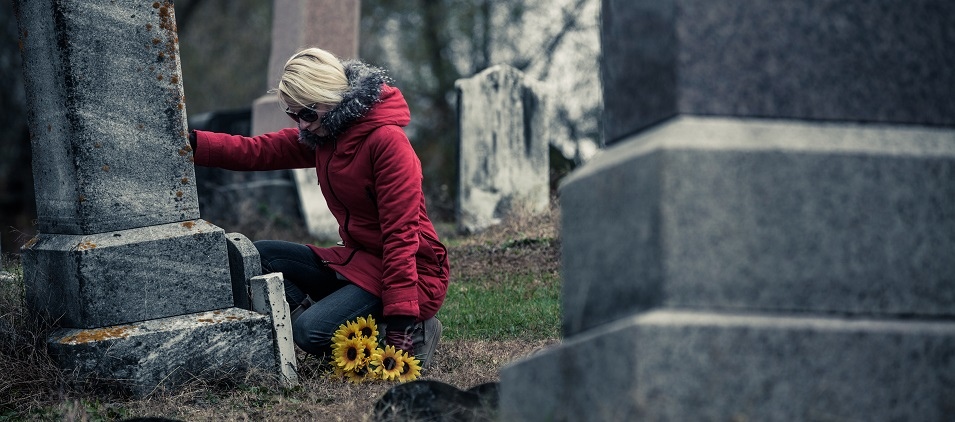
There are few human rites of passage that are truly universal. Every culture is different and holds to unique conventions. Some cultures have ceremonies for children reaching a certain age, many have traditions involving certain foods, and some celebrate thanksgiving or other harvest festivals.
Despite our differences, we all have certain shared experiences—even if the specifics may vary from place to place. And of all the experiences we share, there is none so universal as dying.
As the saying goes, the only two constants in life are death and taxes—and if Jeff Bezos and the like are any indication, taxes may no longer be so certain after all.
Death is an unavoidable part of the human experience, and as a result those of us left behind experience grief—a complex emotional reaction to a loss that’s usually defined by deep and prolonged sadness.
We feel grief when we lose a loved one, whether it’s a parent or a friend or a pet. The duration and depth of the grief usually depends on a number of factors including how close we were to the one we lost, how much time we spent (or didn’t spend) with them, and the things we may have said (or left unsaid).
The suddenness of the loss may also impact how the grief feels, with unexpected deaths causing a “sharper” pain while a long, lingering illness may lead to a heavy and drawn-out process.
As you read this, you may be grieving a recent loss, or you may be picking up an old grief and recalling how it felt, but one thing is for certain: no one reading this article has escaped, or will escape, the experience.
Because grief is such a universal human experience, a multitude of books, documentaries, articles, and theories have been written about it. One of the most well-known theories is the Kubler-Ross Model, perhaps better known as “the five stages of grief.”
Elisabeth Kubler-Ross was a European psychiatrist who worked with terminally ill patients through their (and their families’) experiences of death and dying. Through her work, she noted a general pattern that people tended to go through. The stages she identified were denial, anger, bargaining, depression, and acceptance. The end and healthiest outcome, of course, would be to progress through all five stages and accept the loss in a healthy fashion.
Unfortunately, the process of grief doesn’t always work so straightforwardly. Some people may begin with denial, then move on to depression before coming back to bargaining. Other may start with anger and stay there for a long time. Some people reach acceptance quickly, only to later return to an earlier stage. Some of us go through the cycle multiple times, each different than the last.
The five stages are a rough description of how grief may look, not how it must look. In fact, more often than not it looks nothing like the five stages. While they may be useful for some people to describe their experience, it is much more likely that the process of grieving will be unique to you—to your life, to your environment, and to the nature of the loss.
This means that the approach you take to deal with your grief, or to walking with a loved one through their own experience of grief, should be unique as well.
This is one reason why dealing with grief has inspired so much of our media. Many films and television shows, for instance, touch on grief as a part of the human experience.
One example would be the Disney film Big Hero 6, which focuses on a boy grieving the loss of his older brother. More recently the Marvel series Wandavision explored grief in a surprisingly healthy and insightful way (for a superhero series), with one character concluding, “What is grief if not love persevering?” That serves as a reminder that grief is a reflection of our closeness with others, evidence of love stronger than death.
Outside of fiction, we have no shortage of self-help books, blogs, and YouTube videos dedicated to helping people recover after a loss. While these can be useful resources, so many of the approaches we take are focused on getting over it as quickly as possible, treating grief almost like an illness that must be cured.
This is very different from how grief is approached in the mental health field. What psychologists generally affirm is that grief is not an illness or a mental health problem, but a natural and healthy (if painful) experience. While some experiences of grief may become so severe that medication, such as antidepressants, may be necessary, most people will resolve their grief without such interventions. Spending time with other loved ones, practicing remembrance for those we’ve lost, and even speaking to a counsellor can all be helpful and healthy ways to deal with loss.
Finally, it might be helpful to recognize that grief can be so challenging because it brings up strong feelings of uncertainty in us surrounding our own deaths.
Cultural anthropologist Ernest Becker wrote that one of the primary emotional drives we experience is a psychological need to deny the reality of death. This motivation causes us to engage in actions that separate us from that reality—mainly, by finding a purpose that is larger than ourselves, such as working for social change or pursuing religious faith.
Whether we seek to avoid death through belief in an afterlife, through engaging in work we hope will outlast our physical lives, or even just by avoiding thoughts of our mortality entirely, the experience of grief is a stark reminder of our own deaths and the uncertainty we may feel about what happens after.
Though if we let it, it can also be a catalyst for us to not take our lives, or the lives of those we care about, for granted. After all, we’re all in this together. Whatever happens, happens to all of us in the end.




















